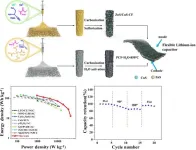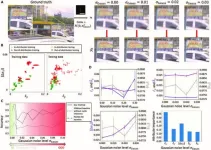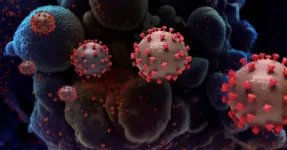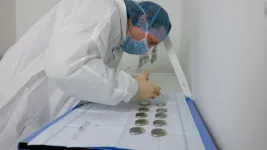(Press-News.org) 16 January 2024 – EMBO is pleased to announce that ten life scientists have been awarded EMBO Installation Grants, which support group leaders who will move to, or have recently moved to, countries participating in the scheme. The scientists’ inspiring research spans a wide range of biological processes: ageing, tumour biology, gut-brain axis communication, microbiota and gene editing tools are among the topics they are exploring.
One installation grantee will establish a laboratory in the Czech Republic, one in Greece, two in Hungary, one in Lithuania, three in Poland, one in Portugal and one in Türkiye. All grantees have demonstrated a commitment to international research and collaboration. In the four years prior to their application, they have spent at least two consecutive years outside the country in which they are now establishing their laboratory. Six of the ten grantees are female and four are male.
EMBO Director Fiona Watt says: “We are delighted that these exceptional scientists are supported by EMBO. We promote excellence in the life sciences in all parts of Europe and beyond, and look forward to the contributions of the new installation grantees. Their research will undoubtedly both strengthen the life sciences in their respective countries and enrich our wider scientific community.”
EMBO Installation Grantees receive a comprehensive support package for their research and professional development. The annual grant of 50,000 euros for three to five years is provided by the country's ministry or funding agency (35,000 euros) and EMBC, the intergovernmental organization of 31 member states that funds the major EMBO Programmes and activities (15,000 euros). The recipients also have access to additional grants of up to 10,000 euros per year as well as travel grants. Integrated into the EMBO Young Investigator Network, they benefit from extensive networking opportunities, training in research leadership and management skills, and access to core facilities at EMBL Heidelberg.
Funding for this year’s installation grants was provided by the Ministry of Education, Youth and Sports of the Czech Republic, the General Secretariat for Research and Innovation of Greece, the Hungarian Academy of Sciences, the Research Council of Lithuania, the Ministry of Education and Science of Poland, the Fundação para a Ciência e a Tecnologia of Portugal, and the Scientific and Technological Research Council of Türkiye. Greece and Hungary joined the EMBO Installation Grant scheme in 2023.
The next application deadline is 15 April 2024. Full details of the scheme, including eligibility criteria and the application process, are available here.
Name
Research project
Host institute
Maciej Cieśla
Coordination of alternative splicing in ageing of hematopoietic stem cells
IMol Polish Academy of Sciences, Warsaw, PL
H. Atakan Ekiz
Investigating long noncoding RNAs in melanomagenesis and immunoevasion
Institute of Technology, Izmir, TR
Ilana Gabanyi
Sex and age specificities influencing the gut-brain axis communication
Instituto Gulbenkian de Ciência, Oeiras, PT
Stephen Jones
Developing robust and predictable gene editing tools
Vilnius University, LT
Aleksandra Kolodziejczyk
Role of microbiota in progression of liver disease
International Institute of Molecular and Cell Biology, Warsaw, PL
Christina Kyrousi
Decoding the role of cilia in neurodevelopmental and psychiatric disorders
University Mental Health Research Institute, Athens, GR
Viktória Lázár
Exploring new strategies against genotoxin-producing gut pathogens
Biological Research Centre, Szeged, HU
Ewelina Malecka-Grajek
From dynamics of bacterial RNA degradation to gene expression manipulation tools
International Institute of Molecular and Cell Biology, Warsaw, PL
Hana Polasek-Sedlackova
Checking on replication origins
Institute of Biophysics, Brno, CZ
Gergely Róna
Function of D-type cyclins in neuronal DNA repair and neurodegeneration
Research Centre for Natural Sciences, Budapest, HU
END
Ten scientists receive EMBO Installation Grants
2024-01-16
ELSE PRESS RELEASES FROM THIS DATE:
Dual-metal sulfides improve overall function of anode material in lithium-ion capacitors
2024-01-16
The use of dual metal sulfides, specifically ZnS/CuS, shows marked improvement in electrochemical stability and performance when included in the design of flexible lithium-ion capacitors over the use of transition metal sulfides and carbon fiber materials.
Technology is becoming more and more integrated with daily life, especially wearable, flexible tech and smart devices. Transition metal sulfide (TMS) materials are popular among choices for anodes in developing flexible lithium-ion capacitors ...
New method for addressing the reliability challenges of neural networks in inverse imaging problems
2024-01-16
Uncertainty estimation is critical to improving the reliability of deep neural networks. A research team led by Aydogan Ozcan at the University of California, Los Angeles, has introduced an uncertainty quantification method that uses cycle consistency to enhance the reliability of deep neural networks in solving inverse imaging problems.
This research was published Dec. 21 in Intelligent Computing, a Science Partner Journal.
Deep neural networks have been used to solve inverse imaging problems, such as image denoising, ...
Aston University receives £10m from Research England to establish the Aston Institute for Membrane Excellence
2024-01-16
The Aston Institute for Membrane Excellence (AIME) will be set up with a £10m grant from Research England
AIME will be led by Professor Roslyn Bill from Biosciences and Professor Paul Topham from Chemical Engineering and Applied Chemistry
The globally unique institute will use biomimetic polymer membranes for applications such as water purification and drug development
Aston University will establish the Aston Institute for Membrane Excellence (AIME), a globally unique, cross-disciplinary institute to develop novel biomimetic membranes, after receiving a major grant of £10m from Research England.
AIME will be led by Professor Roslyn Bill, from the School ...
Innovative COVID-19 analysis supports prevention protocols in health care settings
2024-01-16
In early 2020, severe acute respiratory syndrome coronavirus 2 (SARS-CoV-2), a highly contagious and pathogenic virus, made its alarming debut and quickly spread worldwide, causing the novel coronavirus (COVID-19) pandemic that threatened human health and public safety. While the world was brought to a standstill, hospitals and health care systems entered unchartered territory and quickly adapted to the evolving health crisis to care for their community and keep potentially sick patients and health care workers from spreading the virus.
The magnitude of response involved the reinforced universal masking of health care ...
New study mapping entire genome of oral stem cells opens new doors for regenerative medicine
2024-01-16
Cambridge, Mass., Jan. 16, 2024 - A team of researchers from the ADA Forsyth Institute and University of North Carolina (UNC), Chapel Hill used single-cell transcriptomic analysis to successfully map dental pulp stem cells (DPSC) and periodontal ligament stem cells (PDLSC) and found remarkable differences between them. The study, which appeared in the Journal of Dental Research, provides the most detailed analysis of these stem cells to date, identifying the entire genome of the stem cells and their potential differentiation trajectories.
“Dental pulp and periodontal ligament stem cells both have the potential to develop into any type of cell in the body,” ...
Do violent video games numb us towards real violence?
2024-01-16
Neuroscientists from the University of Vienna and the Karolinska Institute in Stockholm have investigated whether playing violent video games leads to a reduction in human empathy. To do this, they had adult test subjects play a violent video game repeatedly over the course of an experiment lasting several weeks. Before and after, their empathic responses to the pain of another person were measured. It was found that the violent video game had no discernible effect on empathy and underlying brain activity. These results have now been published in the renowned journal eLife.
Video games have become an integral part of the everyday life of many ...
Novel AI platform matches cardiologists in detecting rheumatic heart disease
2024-01-16
WASHINGTON (Jan. 16, 2024) – Artificial intelligence (AI) has the potential to detect rheumatic heart disease (RHD) with the same accuracy as a cardiologist, according to new research demonstrating how sophisticated deep learning technology can be applied to this disease of inequity. The work could prevent hundreds of thousands of unnecessary deaths around the world annually.
Developed at Children’s National Hospital and detailed in the latest edition of the Journal of the American Heart Association, the new AI system combines the power of novel ultrasound probes with portable electronic ...
Researchers examine accuracy of adult body weight estimates in the emergency department
2024-01-16
Knowing a patient’s weight is necessary for many weight-based medications such as thrombolytics, anticoagulants and numerous cardiovascular medications. Scaling drugs to a patient’s weight prevents adverse events from overtreatment and treatment failure due to underdosing. Inaccurate weight estimations may lead to inaccurate drug doses, which could cause patient harm.
However, in the emergency department (ED) during resuscitative care, measuring weight is often impossible. Moreover, little is known about the relative accuracy of different methods currently used to weigh patients during emergency care. For example, ...
Conscience announces first success in open science challenge to predict “hits” for Parkinson’s disease drugs
2024-01-16
TORONTO (16 January 2024) – As part of its pioneering approach to drug discovery, the Canadian nonprofit Conscience announced today that its first open science competition has resulted in the identification of seven promising molecules, or “hits,” that show potential for new, more effective drugs for familial Parkinson’s disease.
This first competition in Conscience’s CACHE (Critical Assessment of Computational Hit-Finding Experiments) Challenge series was funded by The ...
Can recycled pacemakers from the U.S. save lives overseas? Study seeks to find out
2024-01-16
From inside an operating room in Barquisimeto, Venezuela, electrophysiologist Maria Milagros Arends, M.D., threads wires from a pacemaker through the veins and into the heart muscle of a patient.
This pacemaker, which regulates the heartbeat and can be lifesaving, was once in the body of another person. It has been recycled, or “reconditioned”— donated, tested, sterilized and shipped from the United States to the South American country for implantation.
“We have a waiting list of around 300 people who could potentially lose their lives in less than a month,” ...





